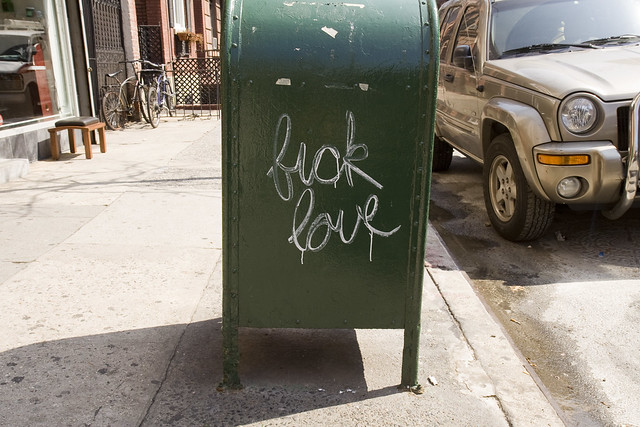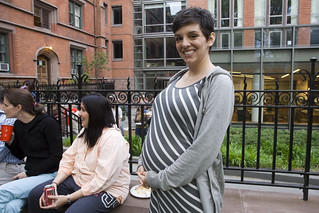
Astoria, New York City. March 24, 2012
365 Part Deux



On Thursday, our confirmation class was covering the book of Acts. In all honesty, it’s rough trying to cover the entire narrative of Acts in forty five minutes. Rather than give an overarching theme and narrow points, I focused the lesson on where Acts started, where it ended, and then we looked at a little at the fun-filled stories, action packed parts of Acts. The kids enjoyed the prison breaks and they got, quickly, the change in tense that occurs chapter 16. They also had no problem seeing Lydia and comparing her to the ordained women leaders at my field site. But what I’m thinking about right now, before I head off to church, is whether any of them will take the last piece of advice that I gave them. For our last story, we read Acts 20:7 where the young man falls asleep, out a window, and dies because Paul is long-winded. A couple of the kids said that they’re going to fall asleep during the sermons now and I said, if they ever get caught by the pastor, to just bring up Acts 20. Now, that got them all a little too excited and they all claim that they’re going to fall asleep during the sermon today. If they do, well, I told them not to rat me out but, in my defense, at least we’ll know they’ve been paying attention in confirmation class.
While digging around the ELCA website for financial statistics, I finally came to terms that in at least one category, I am part of the world-famous 1%. I am a hispanic worshipping in the ELCA and there were only 41,000 of us in 2010. That’s fantastic. FINALLY – a claim to the big time! ONE POINT FOUR PERCENTER RIGHT HERE! Aren’t you glad you know me?
Now, of course, I don’t fit the typical “hispanic/mexican” mold. My family has been on this side of the border for quite awhile so I’m part of the first generation to not learn Spanish (though I keep telling people that I’ll pick it up some day). In other ways, I probably fit the stereotype. I’m stocky, I like mexican food, I enjoy the World Cup, etc. Actually, it’s silly to label myself as a stereotype but when it comes to statistics, I’m an oddity. I’m hispanic but not spanish-language oriented. I’m in a strange place where I’m a minority but I’m not at the same time. I’m part privileged, part not. And I would think, based on the Lutheran Church’s history with the assimilation of immigrant groups in the US, that people in my category would be an easy draw for the ELCA. Built into the very history of the ELCA is the struggle with assimilation and entire generations were born into the place I am at now. You’d think that the atmosphere and flavor of the church should reflect that struggle of assimilation. But I rarely see it and I wonder if the church makes a mistake is misidentifying the wrong characteristics that define the Hispanics as “the other”. The Lutheran church has a long history of dealing with the problem of language and it seems that dealing with language is the first step in reaching out to our current society’s others. However, that doesn’t solve it. Hispanics aren’t a cultural bloc even though their Spanish (in their various dialects) unite them. Mexicans are not Dominicans and Argentineans are not El Salvadorans. A century ago, the differences between the Norwegians and the Swedes were not solved by the Norwegians starting a Swedish language ministry.
The question, I think, is not language based but culture based. Opening the communication doors is a good first step but I wonder if the ELCA – the whole ELCA culture rather than just its leadership – is willing to allow Hispanics into their churches with the expectation that they wouldn’t just become Lutherans but that they will also engage, like the Finns, Germans, and Swedes before them, in the cultural development of what it means to be a Lutheran in the United States. And I’m not sure if that’s really the case – though whether that’s a conscience choice of the ELCA or just a part of the reality that our polity focuses on individual congregations that will mostly be risk-adverse. One of the main power bases of the ELCA is its 95.6% Caucasian population. The question is if they want folks like me at the table. The fact that I’m on the ordination track makes me think they do – but whether they want me to be the exception rather than a norm is something that I sometimes wonder about.
But the brouhaha over Hilary Rosen’s injudicious remarks is not really about whether what stay-home mothers do is work. Because we know the answer to that: it depends. When performed by married women in their own homes, domestic labor is work‚Äîdifficult, sacred, noble work. Ann says Mitt called it more important work than his own, which does make you wonder why he didn’t stay home with the boys himself. When performed for pay, however, this supremely important, difficult job becomes low-wage labor that almost anyone can do‚Äîteenagers, elderly women, even despised illegal immigrants. But here’s the real magic: when performed by low-income single mothers in their own homes, those same exact tasks‚Äîchanging diapers, going to the playground and the store, making dinner, washing the dishes, giving a bath‚Äîare not only not work; they are idleness itself.
…
So there it is: the difference between a stay-home mother and a welfare mother is money and a wedding ring. Unlike any other kind of labor I can think of, domestic labor is productive or not, depending on who performs it.
Katha Pollitt writing in The Nation is exactly spot on. The simple fact is that WHO does the work is just as important as WHAT the work is. Even New York, where nannies can make a lot of money, it depends on WHO the nanny is – their background, race, skin color, class – that depends on how much money they can make. Domestic work isn’t a virtue in itself; the virtue of the individual defines that profession. A lower-class, illegal immigrant, single woman is not the view the same as Ann Romney. They just aren’t and there’s no single way to compare the two without noting the differences. And there are way more lower class women doing domestic work than there are Ann Romneys. The fact that she’s become the face of this reality is insulting, not only to those who are left in her shadow, but to the countless women, and men, who don’t have the opportunity to be stay-at-home moms.
What’s funny about this, to me at least, is how this issue has been around for millennium. You can see it within the Book of Acts. For Luke, the women work best as patrons. In the story of Lydia, Paul, and the slave girl with the spirit of divination, Lydia is valued because she is rich and has the opportunity to take care of Paul. The slave girl, the one who goes around announcing that Paul is a servant of God, has her spirit removed from her. She’s silenced and vanishes from the text while Paul returns back into Lydia’s household later. Although there are many ways to read this text, one way to read it is simply that the slave girl who vanishes is worth less than Lydia for Luke. Paul had an opportunity to baptize the slave girl, to bring her into the fold, but doesn’t. Instead, he silences her. Lydia was given the opportunity for entrance into the body of Christ but the slave girl was not.
The parallel to the Ann Romney/Hillary Rosen story isn’t exact. But it does show that, even in my Christian tradition, the reality is that individuals becomes types that overshadow and hide reality behind them. “It depends” is just as important component of the church as it is with US society. On this side of the eschaton, that’s where we live – in a place where “it depends” matters more than it should. As long as we, as a society, self-define our own elites and look to them as our models of our reality, at the expense of the vast multitudes that will never fit those templates, we’re going to make the mistake of talking about the WHAT but always missing who the WHO really are.
Interesting. It seems that, at the end of last year, the ELCA churchwide organization had a surplus of $4 million. In response to that, the Churchwide Council increased the 2012 budget for operations by $1.4 million (to $65,498,135) and increased the ELCA World Hunger budget by $1.3 million (to $19,900,000). Where that extra money is going to exactly, I have no idea.
As Spirit of a Liberal points out, it might appear that the austerity measures due to the 2009 churchwide sexuality decision is starting to work its way out (but I doubt sexuality was the issue entirely – the economy is a bigger chunk of that). In Nov. 2009, the ELCA cut its 2010 budget by $7.7 million to $69,022,800 (World Hunger was left at $18.7 milion). The original budget for 2010 was approved in August 2009 was $76.69 million. A year ago (April 10, 2011), the original plan for the 2012 budget was only $61.8 million. So the new change in the budget (an increase to $65 million) and almost $20 million for World Hunger is a nice change. It’s possible a corner has turned.
Of course, the ELCA’s budget is way below the proposed budget in 2008 and 2009 of $81 million. Our support for ELCA World Hunger has remained rather high, considering, but $65 million isn’t $81 million. And, if the numbers I found were right, we’ve only dropped about 400 congregations since 2008 (though I can’t find 2011/2012 statistics). Those churches (and their synods) were not giving $15 million to churchwide support. Thus, funding overall, is down (obviously). But I do like that our work for ELCA World Hunger is still rather high. It could have been dropped but it wasn’t. I value that commitment.
Of course, where that $65 million is going, and how that’s moving along, if I studied it, I’d probably have some opinions about where I think it should be going. But I’ll solve that problem once this semester is over.
 I get asked a lot whether my wife and I have a name for the kid yet. Let me just come out and say that we’re keeping it under wraps. I usually answer the question with “we don’t have a name yet; we have a list; we’re gonna wait till we meet the guy.” And this is all true. We have a spreadsheet – a google doc that we share and update every once in awhile. And we have a color code system for names that we like and names that we don’t (though my suggestions, rightly, are usually shot down). So, the world will know the name once the kid is born. Because, I feel, that’s when we’ll know too.
I get asked a lot whether my wife and I have a name for the kid yet. Let me just come out and say that we’re keeping it under wraps. I usually answer the question with “we don’t have a name yet; we have a list; we’re gonna wait till we meet the guy.” And this is all true. We have a spreadsheet – a google doc that we share and update every once in awhile. And we have a color code system for names that we like and names that we don’t (though my suggestions, rightly, are usually shot down). So, the world will know the name once the kid is born. Because, I feel, that’s when we’ll know too.
But when it comes to the actual name, I find myself thinking ahead. I don’t really pay attention to the nicknames that kids will give him because, well, kids are creative and they’ll come up with something. I tend to find myself, mostly, thinking about future options for his career in professional sports. What are fans going to call him? What are his teammates going to say? Are they going to give him an action name or a riff on his given name? If I give him a boring name, will he have no chance at a cool nickname? Can his name, or nickname, be put in an acronym for NBC, CBS, or ESPN? These are important questions! IMPORTANT! We’ve gotta be prepared for all future possibilities! And even if he ended up on Wall Street or with a Bishop hat or working in retail, he’s going to need a nickname. He can’t be like me and rely on the names of rappers from the late 80s/early 90s to help him out. He’s gotta have options. OPTIONS!
This is probably why I shouldn’t be allowed to name children.
This might be, possibly, my favorite reason yet on why we should get rid of the common cup.
From the Annals of Hygiene, Volume 7, 1892. I’m starting to notice that the main agitators of the individual cup movement were based, initially, in Ohio, Philadelphia, and Brooklyn. However, it wasn’t until churches in Rochester got into the business (and the Gray Lady reported on it), that things got out of hand. Now if only I had a chance to take a look at Synod minutes from Ohio….